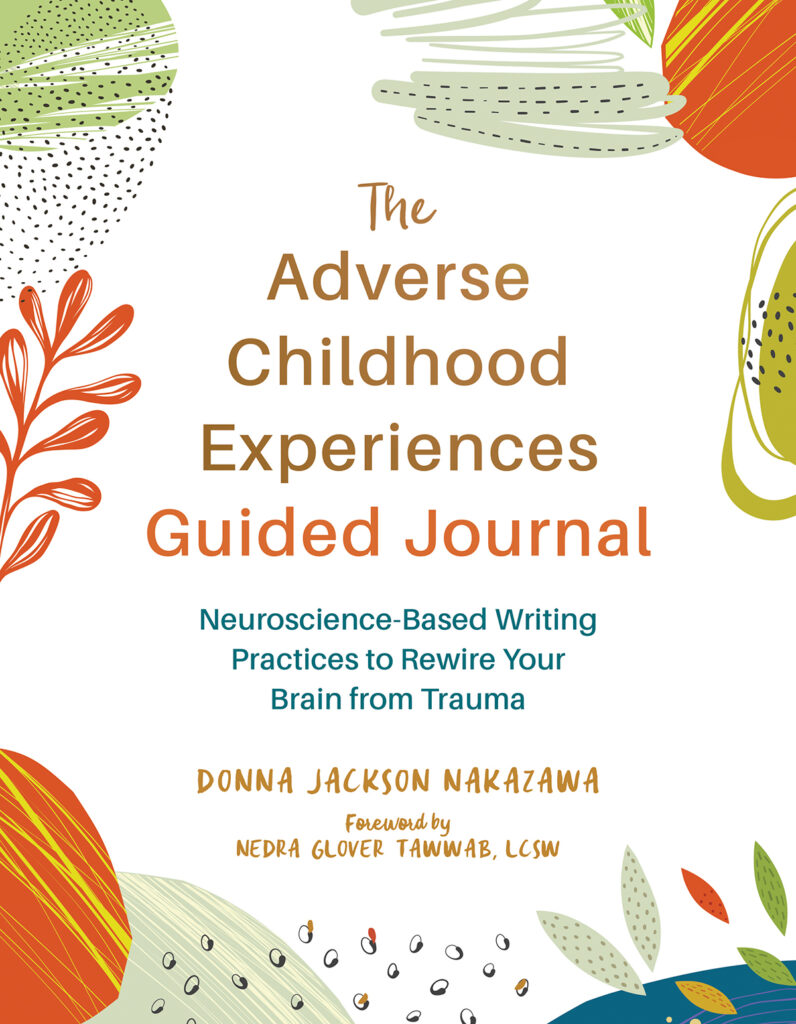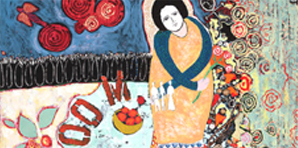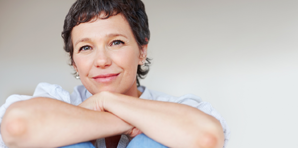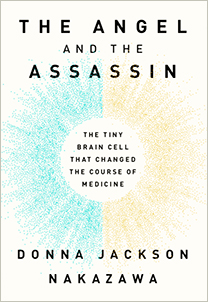Childhood Disrupted
How Your Biography Becomes Your Biology And How You Can Heal
by Donna Jackson Nakazawa
“Childhood Disrupted helps shift the paradigm in our understanding of health and well-being by unveiling the role that early adversity plays in our physical and emotional adult health. Donna offers a missing piece of the puzzle as to why women suffer in disproportionate numbers from chronic physical and mental health conditions, and opens a new and much-needed door for healing.”
—Amy Myers MD author, New York Times Best Seller, The Autoimmune Solution
“A truly important gift of understanding—illuminates the heartbreaking costs of childhood trauma and like good medicine offers the promising science of healing and prevention.”
—Jack Kornfield, PhD, author of A Path with Heart
“Nakazawa writes compassionately for readers struggling to make sense of what happened during their childhoods and how their health may be affected . . . [An] engaging work of scientific translation.”
— Health Affairs
“Every few years a book comes along that changes the way we view ourselves, our society, and our place in the world. This is such a book. Compulsively readable and deeply moving, Childhood Disrupted contains surprising insights into the power of childhood experience on every page.”
—Shannon Brownlee, MS, author of Overtreated: Why Too Much Medicine is Making Us Sicker and Poorer and senior vice president of the Lown Institute
“This groundbreaking book connects the dots between early life trauma and the physical and mental suffering so many live with as adults. Nakazawa fully engages us with fascinating, clearly written science and moving stories from her own and others’ stuggles with life-changing illness. Childhood Disrupted offers a blend of fresh insight into the impact of trauma and invaluable guidance in turning toward healing!”
—Tara Brach, PhD, author of Radical Acceptance and True Refuge
“Long overdue, Childhood Disrupted is a courageous, compassionate, and rigorous every-persons guide through the common roots and enduring impact of childhood trauma in each of our lives. Linking breakthrough science with our everyday lived experience, Childhood Disrupted inescapably and artfully leads the reader to take practical steps and grasp the urgency of coming to terms with and taking a stand to heal the legacy of trauma in our personal and collective lives.”
—Christina Bethell, PhD, MBH, MPH Professor of Child Health, Johns Hopkins Bloomberg School of Public Health
“Childhood Disrupted masterfully captures the complexity of how early life adversity imprints on our biology and stalks our health into adulthood. Heart rending stories of hardship and triumph laced with medical facts and findings creates a framework of practical advice for remaining unbroken in a challenging world.”
—Margaret M McCarthy, PhD, Professor and Chair, Dept. of Pharmacology, University of Maryland School of Medicine
“Donna has once again taken a difficult medical topic and made it not only easy to understand, but a great read. Eye-opening and inspiring, Childhood Disrupted provides a paradigm-shifting roadmap for understanding how early stress is linked to later illness, and offers a must-read vision for how to begin healing at any age. This book will help readers and especially women better understand the biology of stress, and jumpstart important new conversations about our health and well-being!”
—DeLisa Fairweather, PhD, Director of Cardiovascular Translational Research, Mayo Clinic
“Childhood Disrupted is a timely book that summarizes the effects of childhood adversity, incorporating the current science in a very personalized and approachable way. The more we understand about childhood adversity and its imprint on our body and brain, the more we can help each other recover from its harmful effects. This is an important read for anyone looking to help those afflicted by childhood adversity, whether personally or in a caring role such as parents, teachers, and health care workers.”
—Ryan Herringa, M.D., Ph.D., Assistant Professor of Child & Adolescent Psychiatry, University of Wisconsin School of Medicine & Public Health
“In this stimulating book that eloquently describes the effects of one’s biography on mind, brain, and body, Nakazawa guides us through a step by step path to recovery. This work represents an invaluable source of hope and inspiration for anyone who is suffering from the aftermath of early adverse experience.”
—Ruth A Lanius, MD, PhD, Professor of Psychiatry, Harris-Woodman Chair, director, posttraumatic stress disorder (PTSD) research unit, University of Western Ontario
“If you want to know why you’ve been married three times. Or why you just can’t stop smoking. Or why the ability to control your drinking is slipping away from you. Or why you have so many physical problems that doctors just can’t seem to help you with. Or why you feel as if there’s no joy in your life even though you’re “successful”…..Read Childhood Disrupted, and you’ll learn that the problems you’ve been grappling with in your adult life have their roots in childhood events that you probably didn’t even consider had any bearing on what you’re dealing with now. Donna Jackson Nakazawa does a thorough and outstanding investigation of exactly how your childhood made you ill and/or joyless, and how you can heal.”
—Jane Stevens, editor, ACEsConnection.com
A groundbreaking book showing the link between Adverse Childhood Experiences (ACEs) and adult illnesses such as heart disease, autoimmune disease, and cancer—Childhood Disrupted also explains how to cope with these emotional traumas and even heal from them.
Your biography becomes your biology. The emotional trauma we suffer as children not only shapes our emotional lives as adults, it also affects our physical health, longevity, and overall wellbeing. Scientists now know on a bio-chemical level exactly how parents’ chronic fights, divorce, death in the family, being bullied or hazed, and growing up with a hypercritical, alcoholic, or mentally ill parent can leave permanent, physical “fingerprints” on our brains.
When we as children encounter sudden or chronic adversity, excessive stress hormones cause powerful changes in the body, altering our body chemistry. The developing immune system and brain react to this chemical barrage by permanently resetting our stress response to “high,” which in turn can have a devastating impact on our mental and physical health.
Donna Jackson Nakazawa shares stories from people who have recognized and overcome their adverse experiences, shows why some children are more immune to stress than others, and explains why women are at particular risk. Groundbreaking in its research, inspiring in its clarity, Childhood Disrupted explains how you can reset your biology—and help your loved ones find ways to heal.
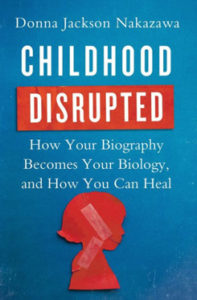
PRODUCT DETAILS
Hardcover | $28.00
Published by Atria Books
July 7, 2015 | 304 Pages | 6 x 1 x 9 inches | ISBN 9781476748351
Paperback | 13.99
Published by Atria Books
July 26, 2016 | 304 pages | 5.5 x 0.7 x 8.38 inches | ISBN 9781476748368
Childhood Disrupted: Introduction
This book explores how the experiences of childhood shape us into the adults we become. Cutting-edge research tells us that what doesn’t kill you doesn’t necessarily make you stronger. Far more often, the opposite is true: the early chronic unpredictable stressors, losses, and adversities we face as children shape our biology in ways that predetermine our adult health. This early biological blueprint depicts our proclivity to develop life-altering adult illnesses such as heart disease, cancer, autoimmune disease, fibromyalgia, and depression. It also lays the groundwork for how we relate to others, how successful our love relationships will be, and how well we will nurture and raise our own children.
My own investigation into the relationship between childhood adversity and adult physical health began after I’d spent more than a dozen years struggling to manage several life-limiting autoimmune illnesses while raising young children and working as a journalist. In my forties, I was paralyzed twice with an autoimmune disease known as Guillain-Barré syndrome, similar to multiple sclerosis, but with a more sudden onset. I had muscle weakness; pervasive numbness; a pacemaker for vasovagal syncope, a fainting and seizing disorder; white and red blood cell counts so low my doctor suspected a problem was brewing in my bone marrow; and thyroid disease.
Still I knew: I was fortunate to be alive, and I was determined to live the fullest life possible. If the muscles in my hands didn’t cooperate, I clasped an oversized pencil in my fist to write. If I couldn’t get up the stairs because my legs resisted, I sat down halfway up and rested. I gutted through days battling flulike fatigue—pushing away fears about what might happen to my body next; faking it through work phone calls while lying prone on the floor; reserving what energy I had for moments with my children, husband, and family life; pretending that our “normal” was really okay by me. It had to be—there was no alternative in sight.
Increasingly, I devoted my skills as a science journalist to helping women with chronic illness, writing about the intersection between neuroscience, our immune systems, and the innermost workings of our human hearts. I investigated the many triggers of disease, reporting on chemicals in our environment and foods, genetics, and how inflammatory stress undermines our health. I reported on how going green, eating clean, and practices like mind-body meditation can help us to recuperate and recover. At health conferences I lectured to patients, doctors, and scientists. My mission became to do all I could to help readers who were caught in a chronic cycle of suffering, inflammation, or pain to live healthier, better lives.
In the midst of that quest, three years ago, in 2012, I came across a growing body of science based on a groundbreaking public health research study, the Adverse Childhood Experiences Study, or ACE Study. The ACE Study shows a clear scientific link between many types of childhood adversity and the adult onset of physical disease and mental health disorders. These traumas include being verbally put down and humiliated; being emotionally or physically neglected; being physically or sexually abused; living with a depressed parent, a parent with a mental illness, or a parent who is addicted to alcohol or other substances; witnessing one’s mother being abused; and losing a parent to separation or divorce. The ACE Study measured ten types of adversity, but new research tells us that other types of childhood trauma—such as losing a parent to death, witnessing a sibling being abused, violence in one’s community, growing up in poverty, witnessing a father being abused by a mother, being bullied by a classmate or teacher—also have a long-term impact.
These types of chronic adversities change the architecture of a child’s brain, altering the expression of genes that control stress hormone output, triggering an overactive inflammatory stress response for life, and predisposing the child to adult disease. ACE research shows that 64 percent of adults faced one ACE in their childhood, and 40 percent faced two or more.
My own doctor at Johns Hopkins medical institutions confessed to me that she suspected that, given the chronic stress I’d faced in my childhood, my body and brain had been marinating in toxic inflammatory chemicals my whole life—predisposing me to the diseases I now faced.
My own story was a simple one of loss. When I was a girl, my father died suddenly. My family struggled and became estranged from our previously tight-knit, extended family. I had been exceptionally close to my father and I had looked to him for my sense of being safe, okay, and valued in the world. In every photo of our family, I’m smiling, clasped in his arms. When he died, childhood suddenly ended, overnight. If I am honest with myself, looking back, I cannot recall a single “happy memory” from there on out in my childhood. It was no one’s fault. It just was. And I didn’t dwell on any of that. In my mind, people who dwelled on their past, and especially on their childhood, were emotionally suspect.
I soldiered on. Life catapulted forward. I created a good life, worked hard as a science journalist to help meaningful causes, married a really good husband, and brought up children I adored—children I worked hard to stay alive for. But other than enjoying the lovely highlights of a hard-won family life, or being with close friends, I was pushing away pain. I felt myself a stranger at life’s party. My body never let me forget that inside, pretend as I might, I had been masking a great deal of loss for a very long time. I felt myself to be “not like other people.”
Seen through the lens of the new field of research into Adverse Childhood Experiences, it suddenly seemed almost predictable that, by the time I was in my early forties, my health would deteriorate and I would be brought—in my case, quite literally—to my knees.
Like many people, I was surprised, even dubious, when I first learned about ACEs and heard that so much of what we experience as adults is so inextricably linked to our childhood experiences. I did not consider myself to be someone who had had Adverse Childhood Experiences. But when I took the ACEs questionnaire and discovered my own ACE Score, my story also began to make so much more sense to me. This science was entirely new, but it also supported old ideas that we have long known to be true: “the child is father of the man.” This research also told me that none of us is alone in our suffering.
One hundred thirty-three million Americans suffer from chronic illness and 116 million suffer from chronic pain. This revelation of the link between childhood adversity and adult illness can inform all of our efforts to heal. With this knowledge, physicians, health practitioners, psychologists, and psychiatrists can better understand their patients and find new insights to help them. And this knowledge will help us ensure that the children in our lives—whether we are parents, mentors, teachers, or coaches—don’t suffer from the long-term consequences of these sorts of adversity.
To learn everything I could, I spent two years interviewing the leading scientists who research and study the effects of Adverse Childhood Experiences and toxic childhood stress. I combed through seventy research papers that comprise the ACE Study and hundreds of other studies from our nation’s best research institutions that support and complement these findings. And I followed thirteen individuals who suffered early adversity and later faced adult health struggles, who were able to forge their own life-changing paths to physical and emotional healing.
In these pages, I explore the damage that Adverse Childhood Experiences can do to the brain and body; how these invisible changes contribute to the development of disease including autoimmune diseases, long into adulthood; why some individuals are more likely to be affected by early adversity than others; why girls and women are more affected than men; and how early adversity affects our ability to love and parent.
Just as important, I explore how we can reverse the effects of early toxic stress on our biology, and come back to being who we really are. I hope to help readers to avoid spending so much of their lives locked in pain.
Some points to bear in mind as you read these pages:
- Adverse Childhood Experiences should not be confused with the inevitable small challenges of childhood that create resilience. There are many normal moments in a happy childhood, when things don’t go a child’s way, when parents lose it and apologize, when children fail and learn to try again. Adverse Childhood Experiences are very different sorts of experiences; they are scary, chronic, unpredictable stressors, and often a child does not have the adult support needed to help navigate safely through them.
- Adverse Childhood Experiences are linked to a far greater likelihood of illness in adulthood, but they are not the only factor. All disease is multifactorial. Genetics, exposures to toxins, and infection all play a role. But for those who have experienced ACEs and toxic stress, other disease-promoting factors become more damaging. To use a simple metaphor, imagine the immune system as being something like a barrel. If you encounter too many environmental toxins from chemicals, a poor processed-food diet, viruses, infections, and chronic or acute stressors in adulthood, your barrel will slowly fill. At some point, there may be one certain exposure, that last drop that causes the barrel to spill over and disease to develop. Having faced the chronic unpredictable stressors of Adverse Childhood Experiences is a lot like starting life with your barrel half full. ACEs are not the only factor in determining who will develop disease later in life. But they may make it more likely that one will.
- The research into Adverse Childhood Experiences has some factors in common with the research on post-traumatic stress disorder, or PTSD. But childhood adversity can lead to a far wider range of physical and emotional health consequences than the overt symptoms of post-traumatic stress. They are not the same.
- The Adverse Childhood Experiences of extreme poverty and neighborhood violence are not addressed specifically in the original research. Yet clearly, growing up in unsafe neighborhoods where there is poverty and gang violence or in a war-torn area anywhere around the world creates toxic childhood stress, and that relationship is now being more deeply studied. It is an important field of inquiry and one I do not attempt to address here; that is a different book, but one that is no less important.
- Adverse Childhood Experiences are not an excuse for egregious behavior. They should not be considered a “blame the childhood” moral pass. The research allows us to finally tackle real and lasting physical and emotional change from an entirely new vantage point, but it is not about making excuses.
- This research is not an invitation to blame parents. Adverse Childhood Experiences are often an intergenerational legacy, and patterns of neglect, maltreatment, and adversity almost always originate many generations prior to one’s own.
The new science on Adverse Childhood Experiences and toxic stress has given us a new lens through which to understand the human story; why we suffer; how we parent, raise, and mentor our children; how we might better prevent, treat, and manage illness in our medical care system; and how we can recover and heal on a deeper level than we thought possible.
And that last bit is the best news of all. The brain, which is so changeable in childhood, remains malleable throughout life. Today researchers around the world have discovered a range of powerful ways to reverse the damage that Adverse Childhood Experiences do to both brain and body. No matter how old you are, or how old your children may be, there are scientifically supported and relatively simple steps that you can take to reboot the brain, create new pathways that promote healing, and come back to who it is you were meant to be.
To find out about how many categories of ACEs you might have faced when you were a child or teenager, and your own ACE Score, turn the page and take the Adverse Childhood Experiences Survey for yourself.
Copyright © Donna Jackson. All rights reserved.
Past Press Events for Childhood Disrupted
(2015-2019)
July 7, 2015
7:00
Book talk and book signing with Donna Jackson Nakazawa
The Ivy Bookshop
Baltimore, MD
July 15, 2015
1:15 PM
The Staying Young Radio Show
http://www.talkzone.com/shows/199/stayingyoungradioshow.html
3:17 PM
The Michael Dresser Show
A Radio Show with Michael Dresser
http://www.michaeldressershow.com
8:00 PM
Conversations in Care
A Podcast with Tami Neumann
http://www.conversations-in-care.com
July 16, 2015
10:00 AM
The Changing Behavior Network
A Radio-Style Podcast with Dr. James Sutton
http://www.thechangingbehaviornetwork.com
11:30 AM
Women’s Watch
WBZ Boston
July 17, 2015
7:00 PM
Discussion & Book Signing with Donna Jackson Nakazawa
The Annapolis Bookstore
35 Maryland Avenue
Annapolis, MD 21401
(410) 280-2339
http://www.annapolisbookstore.com
August 5, 2015
7:00 PM
Health Media Now—It’s All About Being Healthy
An Online Radio Program with Denise Messenger
http://www.blogtalkradio.com/healthmedianow
August 13, 2015
The Trauma Therapist Podcast
with Guy Crawford
http://www.thetraumatherapistproject.com/podcast/donna-jackson-nakazawa/
August 18, 2015
1:00 PM
Happy Healthy You
A Podcast with Connie Bowman
http://conniebowman.com/happyhealthyyou/
August 27
11:10 AM
Healthy Talk
A Live RadioMD Program with Dr. Michael Smith
http://radiomd.com/show/healthy-talk
September 14, 2015
Children’s and Teen’s Health Summit
http://www.childrenshealthsummit.com
September 22, 2015
7:00 PM
Talk with Donna Jackson Nakazawa
The Baltimore Free School
http://freeschool.redemmas.org/courses/770
Books will be available for purchase.
September 27, 2015
Noon to 3:00
Donna Jackson Nakazawa talking and signing books
The Baltimore Book Festival
September 29, 2015
1:00 PM ET
“About Health” with Rona Renner
KPFA Radio San Francisco
Details TK
October 6, 2015
2:30 PM
The Joan Slotkin Podcast
October 17, 2015
2:00 PM
Meet the Author: Donna Jackson Nakazawa
Perry Hall Library
9685 Honeygo Boulevard
Perry Hall, MD 21228
(410) 887-5195
http://www.bcpl.info/perry-hall
Books will be available for purchase, courtesy of the Ivy Bookstore.
October 19, 2015
1:00 – 2:00
Midday with Dan Roddricks
WYPR NPR Baltimore
November 13, 2015
1:00-5:00 PM
Intergenerational Trauma and Post Traumatic Growth
The New Day Campaign
College Community Center, CCBC Dundalk
John E. Ravekes Theatre,
7200 Sollers Point Rd, Dundalk MD, 21222
March 3, 2016
6:30-8:30 PM
Safe Shores — The DC Children’s Advocacy Center
Screening of The Raising of American and Panel Discussion
on Childhood Trauma and Well-Being
429 O Street, NW
Washington DC
March 5, 2016
10:30-2:30
Saint Martin’s Authors’ Luncheon
Chesapeake Bay Beach Club
500 Marina Club Rd
Stevensville, MD 21666
April 16, 2016
2:30 PM
The Annapolis Book Festival
The Key School
Annapolis, MD
April 19, 2016
Healing Childhood Trauma
Legal Aid Society of New York
111 Livingston Street
Brooklyn, NY
July 13, 2016
Keynote, Healing Childhood Trauma
Conference on Trauma Informed Care
Johns Hopkins Medical Institution
Baltimore, MD
July 26, 2016
Paperback release of “Childhood Disrupted”
October 16, 2016
Duke Women’s Forum
The Ivy Bookshop
Baltimore, Maryland

April 8, 2017
Learning & The Brain Conference
Positive Student Minds: The Science of Promoting Positive Emotions, Empathy, Grit & Gratitude
Arlington, VA, Crystal Gateway Marriott
Childhood Disrupted: How Children’s Biography Becomes Their Biology, and How We Ensure Their Resiliency Donna Jackson Nakazawa, BA, Award Winning Science Journalist and Researcher; Author, Childhood Disrupted: How Your Biography Becomes Your Biology, and How You Can Heal (2015), which examines the lifelong consequences of adverse childhood experiences.
October 2-3, 2017
Keynote, booksigning and workshop, Children’s Trust of South Carolina
2017 Prevention Conference: Embracing Prevention, Empowering Communities
Columbia Metropolitan Convention Center
1101 Lincoln Street, Columbia, S.C.
 October 15, 2017
October 15, 2017
Keynote Speaker, SIRPA Chronic Pain Conference
Chronic Pain: The Role of Emotions
Royal Academy of Medicine
Award-winning science journalist Donna Jackson Nakazawa who will discuss the decades of research linking adverse childhood experiences to ill-health, including chronic pain, in later life.
Register here.
October 19th, 2017
Keynote Speaker
Stony Brook Children’s Hospital School Intervention Program,
Helping Children with Chronic Illnesses Thrive
The role of adverse childhood experiences, including facing medical adversity and chronic conditions in childhood, in future adult health, and strategies for resilience building in children who have suffered from medical adversity.
Stony Brook, New York
Register here.
November 14th, 2017
1 p.m. EST, I’ll be giving a live interactive chat & talk on
Well-Being, Self-Care, and ACEs, as part of ACEs Connection 2017 Parenting With ACEs Fall Chat Series
(How to Attend Online Chats:
Members of ACEs Connection : Join Parenting with ACEs Community & go there at time/day of chat.)
 March 4th, 2018
March 4th, 2018
Keynote Speaker
Becoming Trauma Informed Practitioners
Nutritional Therapy Association Conference, Vancouver, WA
Donna Jackson Nakazawa, Award Winning Science Journalist and Researcher; Author, Childhood Disrupted: How Your Biography Becomes Your Biology, and How You Can Heal (2016), discusses the lifelong consequences of adverse childhood experiences.
May 31st, 2018
9 – 12:00
Keynote Speaker
Continuing Practitioner Education credits
Becoming Trauma Informed
Rutgers University Behavioral Health Care
June 9, 2018
Keynote Speaker
Continuing Medical Education credits
Becoming Trauma Informed
Annual Pediatric Conference
Golisano Children’s Hospital of Southwest Florida
February 21st, 2019
Keynote Speaker
The Children’s Home Society of North Carolina
Winston Salem, North Carolina
Short video clip featuring Donna’s lecture, by Emmy-nominated
NBC TV news reporter Wanda Starke.
March 7, 2019
Keynote Speaker
Workshop Leader
5 hours of Continuing Clinical Education credits
2019 CarePlus Foundation Annual Education Conference
Bergen Community College
8:30 to 3:00
Paperback
July 26, 2016 | ISBN 9781476748368 | $13.99
Bookshop.org | Barnes & Noble | Books A Million | Hudson Booksellers | Powell’s | Target | Walmart | Amazon
Ebook
Barnes & Noble | Apple Books | Google Play Store
Audiobook
libro.fm | Barnes & Noble | Books A Million | Kobo | audiobooks.com | audiobookstore.com | Audible | Google Play Store
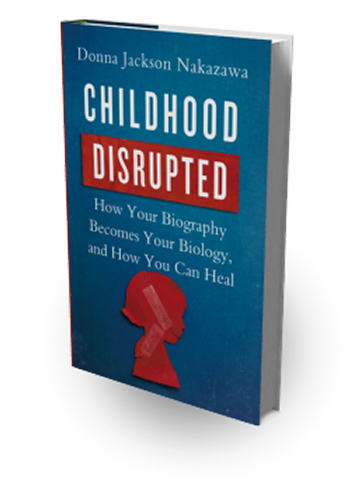
More from
Donna Jackson Nakazawa
Donna’s Online Courses
